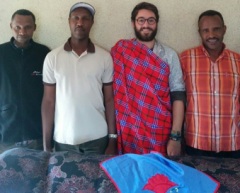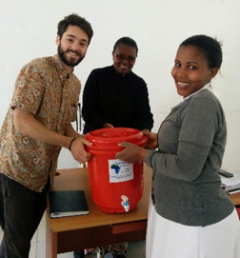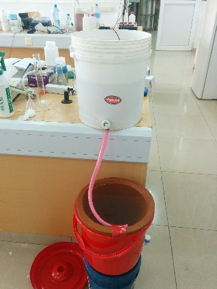On May 20, 2018, I left my home in Ottawa, Ontario to travel to the Arusha Region of Northern Tanzania to begin my tenure as a member of the Queen Elizabeth (QE) Scholarship – Advanced Scholars’ first cohort. Though I was familiar with Tanzania already from my time spent working there during the previous summer, I was anxious to learn of what was to come. How would things be different from the previous year? Would I accomplish all that I had set out to do? Would this be my first substantial step towards improving the lives of the low-income individuals for whom my research is designed? Is it simply quixotic to think that my work could even make such a difference? This cocktail of thoughts and feelings swirled through my mind as my 30-hour journey to Kilimanjaro International Airport progressed, reaching a cacophonic chorus as the wheels touched ground. Here it was – the actualization of all for which I had prepared and pondered. My journey had begun.
So, to take a small step back, it is first important to explain what my research is about. My project takes a multi-dimensional approach to improving access to safe drinking in the District of Longido in Tanzania, specifically focusing efforts in Longido Town. Longido is a rural area, comprised of predominantly Massai residents, with a history of challenges related to water quantity and quality. As Virginia Taylor, a retired Carleton University instructor with over ten years of experience working in Longido put it, “when you look at the issues that people [in Longido] are addressing, water is always paramount. It is always the first issue that people talk about.”

Figure 1 – From left to right: Safari (Filter Fabricator), Liston (Business Manager of SWCEA), Robbie (Me), Kim (Founder and Owner of SWCEA)
My research specifically focuses on the water quality portion of those concerns, with an overall goal of improving health conditions within the community. So, to meet the need for a solution to this pervasive and worsening challenge, my project is partnered with a local manufacturer of ceramic water filters called Safe Water Ceramics of East Africa (SWCEA). A ceramic water filter is a simple water treatment technology with well documented bacteria removal effectiveness, which makes them a great candidate for reducing the prevalence of diarrheal diseases (like Cholera or E. coli poisoning) resulting from the consumption of unsafe water. One major issue, however, is the cost per unit is far too high for many individuals to afford, hindering its long-term sustainability. Therefore, the technical element of my research is focused on studying the mechanistic behavior of the filters, its current disinfection-enhancing additives, as well as alternative additives, both independently and in combination with the filter, so alterations may be made to the manufacturing process to reduce costs. Our project incorporates science and data-driven decision making into a localized and human-centred implementation framework, relying on leaders in health and education sectors in Longido to enact the change that they want to see within their community. Sustainability is our number one priority. To learn a little more about the project, please see Dr. Onita Basu’s (supervising professor) webpage: https://carleton.ca/basuresearch/tanzania-water-hub/.

Figure 2 – Me and SWCEA staff (2 left-most adult women) at Longido Modern after donating filters to the school.
Once I arrived in Tanzania, I proceeded to spend the following three months conducting my research in two

Figure 3 – Donating one of the filters to the maternity ward of the local health clinic in Longido
areas of interest; call them social and technical components of the work. In terms of the social, because of a very generous donation, I had the opportunity to introduce a total of 14 filters to 3 schools and a local health clinic. The provision of the filters was accompanied by educational programming on filter use/maintenance, the importance of safe water consumption and proper sanitation practices. The programs were run by SWCEA and me, and were facilitated largely by our partner organization, a local and long-standing NGO called Tanzania Education and Micro-Business Opportunity (TEMBO). This research focus accounted for approximately 30% of my time and had the specific objectives of
introducing the concept of the filters to the community to create an appetite for more, as well as to instill the value of drinking clean water upon children and young adults. The reception from the community was unanimously positive, and I am very excited to learn of the outcomes in the future.

Figure 4 – Ceramic Water Filter being tested at NM-AIST Laboratory
Moreover, in addition to the social work that I was able to do, far more of my time abroad was spent
focusing on the technical elements of this research project. In particular, I worked in a laboratory at our partner academic institution, the Nelson Mandela African Institute of Science and Technology (NM-AIST), running experiments on filters that I had made with the staff at SWCEA. Together, we had made a large swath of filters with different input materials to learn if cheaper alternative materials have comparable or sufficient bacteria removal to what is currently in use. At the moment, it is too early to say whether any large-scale changes may be implemented at the factory, however the results indicate that there is great cost-saving potential.
So, how did all of those thoughts and emotions play out in the end? In summary, I don’t have a good answer. Essentially none of my confoundment has been satisfied, and indeed, an entirely new host of questions have been added to the mixture tantalizing my mind. Having said that, there are certainly some important lessons that I have been able to take away from my experience which will be beneficial in the future. My first lesson learned is that the language chosen to communicate an idea is paramount to positive reception. Scientific evidence acts as a very good basis from which to explain why a concept is valid, however personalized messaging, simple language and, most importantly, the appropriate messenger can be the difference between someone understanding what is said and believing in it. The second lesson that I learned is that progress is slow, and patience is an incredible virtue. Most things do not work out as expected, and almost everything requires more than one try before anything happens. But this is simply the nature of this work, and incremental change is the most sustainable strategy for long-term development.
My time as a QE scholar benefited me greatly, and I am very thankful to have been awarded this opportunity. I was able to improve my communication and leadership skills, learn more about the culture and community within which I am working, build strong connections with partner organizations and other academics and progress my research substantially. Though not without its challenges, my summer in Tanzania was very positively impacted by my participation in the Queen Elizabeth Scholarship program and I feel I learned a lot.